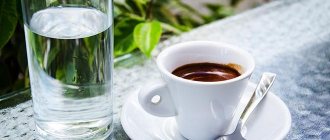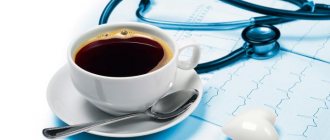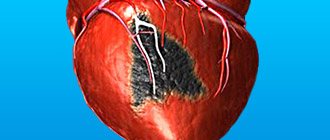Sometimes after a cup of coffee you feel sick. The concept of “bad” is different for everyone - you may feel weak, something similar to panic attacks, abdominal pain or indigestion, tachycardia, dizziness, etc. This can happen to people with chronic diseases as well as to those who appear to be healthy. Some people know about this peculiarity, while others suddenly feel ill after drinking coffee. In any case, you need to know what symptoms may be associated with the problem and what to do about them.
In what situations can you feel sick after drinking coffee?
Most often, things get worse from an overdose of coffee. At the same time, it is not at all necessary that you really drank a lot of it, especially since “a lot” is a relative concept, and we can only talk about the amount of caffeine that the body cannot handle at the moment. Here is just an approximate list of diseases and situations in which even one cup of coffee can make you feel bad:
- Vegetative-vascular dystonia;
- Chronic cardiovascular diseases;
- Tachycardia and arrhythmia;
- High blood pressure;
- Diseases of the gastrointestinal tract;
- Stress;
- State of lack of sleep;
- Illness or weakness of the body.
Most often, things get worse if you drink coffee on an empty stomach, especially if your body is weakened.
Why can you feel sick after drinking coffee?
Caffeine mainly affects three main systems of the body: the brain, heart and blood vessels, as well as the stomach and intestines. Let's look at why it might be bad in each case.
Coffee hurts or makes you dizzy
Caffeine affects the blood vessels of the brain, narrowing them and blocking the production of adenosine, which dilates the blood vessels, maintaining them normal. If the vessels are compressed strongly and sharply, the head begins to feel dizzy from the lack of oxygen and blood, and a headache is felt.
Heart hurts, tachycardia from coffee
Caffeine stimulates the pituitary gland, which in turn releases hormones into the blood that affect the adrenal glands. The adrenal glands produce adrenaline, and therefore the pupils dilate, the pulse quickens, and tachycardia appears. The heart must pump blood faster, and all blood vessels are narrowed.
Nausea, diarrhea after coffee
Coffee, especially with grounds, actively irritates the walls of the gastrointestinal tract, stimulates the production of gastric juice and peristalsis. Symptoms such as nausea, stomach pain, abdominal pain may be felt, and quite often coffee can act as a laxative.
The effect of caffeine on the human body
The invigorating drink is saturated with a substance such as caffeine, which has a tonic effect on the human body. Abuse of this “drug” can lead to addiction. But the surge of energy after drinking coffee is short-lived and can cause unpleasant discomfort.
The effect of an invigorating drink on the body:
- the head becomes clear, thoughts are clear and not confused;
- a good appetite appears;
- the air is inhaled deeply;
- you feel a surge of energy.
The alkaloid caffeine has a direct effect on the receptors of the “gray matter”. It stimulates brain activity, improves impulse transmission and attention. A person’s stupor and drowsiness disappear, he is charged with incredible energy.
Coffee can act for several hours. Then the alkaloid content in the blood decreases, and the patient may again feel overwhelmed and tired.
The effect of an invigorating drink on blood vessels is to improve their tone, accelerate blood flow, increasing the heart rate and pulse, which in turn increases the content of oxygen and nutrients in organs and tissues.
But this condition is not observed in all people. Some people feel nauseous and dizzy after drinking a cup of coffee. Weakness, drowsiness, incredible fatigue, and a desire to rest appear. This is explained by the reaction of a particular organism to the alkaloid.
Is coffee from a coffee shop bad or homemade?
Those who buy a regular glass of coffee from their favorite coffee shop are much less likely to suffer from poor health after drinking coffee. It uses a coffee machine and a standard recipe, meaning the caffeine content in your favorite latte will almost always be the same. At risk are lovers of natural coffee who prepare the drink themselves, in a Turkish coffee, and usually calculate the dosage only approximately.
- First, it could be a new variety that has more caffeine, or a blend with a higher Arabica content. The point is that in the usual dose, for example, a spoon per cup, you will get more caffeine, but the body is not used to this.
- Secondly, it is difficult to calculate the number of grams - they use different spoons at home, and the slide can be larger or smaller. And if you grind the beans before cooking, it is even more difficult to calculate the amount, and it turns out that there is more ground coffee in a Turk.
- Thirdly, a lot depends on how the drink was prepared. If it was simmered over low heat, and then stood in a pot for a while along with the grounds, the concentration of caffeine in it will be much higher than if you cook it relatively quickly and pour it through a filter or strain the grounds.
Even slightly exceeding the usual dosage of caffeine can cause a person to feel unwell. However, this feeling usually passes fairly quickly.
Bad from instant coffee
Instant coffee more often than natural coffee causes stomach pain, weakness, nausea, and sometimes you may feel cold sweat. And in this case, it’s not just about caffeine, although there is usually more of it, but also about all the chemical additives. The share of natural grain in soluble powder or granules is 15-20%, everything else is dyes, stabilizers, preservatives, volume powders, etc. The body reacts to such a “chemical attack” much stronger.
COFFEE IS NOT IMPACTED IN MIGRAINES
Billions of sick heads
Headache is a painful condition that can greatly interfere with daily life. According to the World Health Organization, this is the most common complaint among adults around the globe. Headaches can vary in intensity, but in any case they cause extremely unpleasant sensations in a person. In order to present the picture more vividly, let’s remember what is happening to the unfortunate Stepa Likhodeev from the novel “The Master and Margarita”: “it seemed to him that he could not open his eyes, because if he only did so, lightning would flash and his head would be there it will be blown to pieces. A heavy bell was buzzing in that head, brown spots with a fiery green rim floated between the eyeballs and closed eyelids, and to top it all off, he felt sick.”
In addition to such vivid experiences, frequently recurring headaches prevent us from fully interacting with colleagues and loved ones; they become a tangible financial burden, reducing our ability to work and forcing us to constantly take painkillers. Studies have shown that depression is three times more likely to develop in patients with chronic headaches.
Migraines are severe attacks of headache that can last for several days. Currently, about 1 billion people on the planet suffer from this disease. In this case, an attack can be triggered by external factors. Traditionally, these include bright lights, loud noises, chocolate, cheeses, wine, cocoa and coffee.
Migraine - what are you?
Among all types of headaches, migraine deserves special attention: firstly, it is very common, and secondly, it ranks sixth among all diseases that can lead to disability. Compared to men, migraines occur in women approximately 3-4 times more often. The disease is manifested by a severe throbbing headache, which usually occurs in one half of the head, and during an attack it can spread to the entire head. This is where the name "migraine" comes from - "pain that covers half the skull" - as a result of the merger of the French migraine and the Latin words hemicrania. Attacks can last up to several days, accompanied by nausea, fear of light and sound. Often, before the pain itself occurs, the so-called aura, or harbingers of the disease, appears. The perception of taste and smell may change, there is a feeling of numbness or tingling in one half of the face or body, double vision or bright flashes flash in the eyes. Depending on the specific symptoms and examination data, having excluded other diseases, the neurologist makes diagnoses and prescribes medications that affect the pathological process in the nervous system, and not only relieve pain.
Threats from outside
A large number of studies are devoted to external causes that cause migraine attacks. By changing your lifestyle and reducing the number of such factors, a person can make his life much easier. In addition to strong emotional experiences, physical stress and traditional risk factors for almost all diseases - alcohol abuse and smoking, doctors also found the culprits among ordinary food products. A separate group of “provocateurs” included products containing the amino acid tyramine. These include cocoa, coffee, chocolate, all smoked meats, some citrus fruits and avocados, red wine and aged cheeses. The fact is that tyramine, participating in reactions with enzymes, causes spasm (constriction) of blood vessels and also interferes with the synthesis of the “hormone of joy” - serotonin. Plus, patients with migraine have an innate “predisposition” of the nervous system to trigger a pathological chain leading to a painful attack.
The acquittal
Coffee lovers are encouraged by the results of a new study from three medical centers led by Professor Elizabeth Mostofsky from Harvard Medical School. Scientists observed patients suffering from migraines for six months. Study participants completed electronic questionnaires twice daily covering most aspects of their lives: medication use, sleep characteristics, stress factors, consumption of caffeinated drinks, various foods and alcohol, and menstrual cycle characteristics. In addition, they described in detail the migraine attacks that occurred and the events preceding them. It turned out that when it comes to coffee, the “golden mean” principle applies. Study participants experienced headaches only when drinking three or more cups of coffee per day. The subjects who drank 1-2 servings felt quite satisfactory. These results remained stable despite changes in other factors, such as sleep quality, menstrual cycle timing, and alcohol consumption. Scientists have found some dependence only on taking oral contraceptives, but this issue requires separate consideration.
Golden mean
The authors of the article with the results of the above-mentioned study, which was published in the American Journal of Medicine, provide data that about 87% of Americans drink coffee daily, and we can assume that there are no less lovers of this drink around the world. Just as there are no less of them among people suffering from migraine attacks. Therefore, for such a large number of coffee lovers, the results of the study will be quite good news. In addition to its pleasant taste, coffee also has many beneficial properties. And the results of a recent analytical work from the Italian University of Catania, which analyzed 127 previously completed studies around the world, showed that drinking coffee may reduce the risk of diabetes and Parkinson's disease by 30%.
As a result, we can say that, as in many other aspects of our lives, the main thing is to adhere to the principle of reasonable consumption and moderation.
In addition to food and external ones, there are physiological triggers of migraine:
-Stress
-Hunger
-Fatigue
-Menstrual cycle
1-2 cups of coffee a day does not increase the likelihood of a migraine attack.
About 15% of the world's population suffers from migraine.
Published: December 4, 2021
What to do if you feel sick from coffee?
If every time you drink coffee you feel bad, you should either seriously reduce the dose, or try decaffeinated coffee, or maybe even give it up altogether. But usually it happens bad once, almost by accident, and in this case there is no need to panic: usually everything goes away in about 15-20 minutes. If you feel nauseous, you can try to get rid of the drink you drank; if not, there are ways to help your body return to normal faster:
- If you feel weakness, dizziness, tachycardia, pain in the head, it is advisable to sit down or lie down, ensure an influx of oxygen, perhaps raise your legs above your head so that oxygen flows to the brain. If it's freezing, you can wrap yourself up.
- If there is pain in the heart, increased excitability, pain in the temples, rapid pulse, fever, provide access to air and try to do a few physical exercises, just to speed up the metabolism and the caffeine is processed faster.
In any case, it is good to drink water, you can eat a banana, drink milk. Lemon water may help. Possibly sedatives for the heart and blood vessels.
What exactly should you do if you feel sick after a cup of coffee?
- Lie down, taking a horizontal position, but keeping your head higher than your body.
- Unbutton the collar of your shirt or blouse.
- Provide a flow of fresh air into the room.
- Reduce noise pollution (turn off TV, music).
- Drink some cool water.
- If the condition worsens, call an ambulance.
When buying coffee, you need to pay attention to the manufacturer, its reputation, and the availability of detailed information about the product. Often, in order to save money, the manufacturer dilutes the grains with other ingredients. No one is surprised by cereals or chicory, but the product may contain other substances that provoke a deterioration in well-being. That is why after coffee the condition of a person who is accustomed to the drink and drinks it regularly at home or in a cafe can change.
If an invigorating drink regularly causes changes in your well-being, it is better to give up the drink altogether or try drinking it with milk and without sugar. An alternative can be natural decaffeinated coffee or its analogue - chicory.
Hypertensive patients, people with diabetes, and pregnant women should not drink coffee. These people are at risk for the occurrence of pathological conditions. You need to take care of your health at any age, and it’s easy to give up coffee in favor of healthy green tea, herbal teas or homemade herbal and berry teas.
Conclusions:
- Even a completely healthy person can feel ill after drinking coffee. If this happens once, there is nothing wrong with it.
- Coffee brewed in Turkish coffee may make you feel worse if you do not calculate the dosage or allow the drink to brew with grounds.
- Instant coffee makes you feel sick because it contains a lot of chemical additives that can cause an individual reaction.
- Most often, coffee makes you sick if the body is weakened, the person did not get enough sleep, or drank too much coffee.
- If you feel sick, drink water or milk to neutralize the caffeine.










